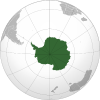Refuge
| Bahia Dorian Refuge | |
|---|---|
| Refuge | |
 Bahia Dorian Refuge Bahia Dorian Refuge | |
 | |
| Coordinates: 64°49′04″S 63°30′15″W / 64.817648°S 63.504133°W / -64.817648; -63.504133 | |
| Country | |
| Location in Antarctica | Dorian Bay Wiencke Island Antarctica |
| Administered by | Argentine Antarctica |
| Established | 1957 (1957) |
| Type | Seasonal |
| Status | Operational |
Dorian Bay (64°49′S 63°30′W / 64.817°S 63.500°W / -64.817; -63.500) is a cove on the northwest side of Wiencke Island, 0.5 nautical miles (1 km) east-northeast of Damoy Point, in the Palmer Archipelago of Antarctica. It was discovered by the French Antarctic Expedition, 1903–05, under Jean-Baptiste Charcot, and named by him after Monsieur Dorian, a member of the French Chamber of Deputies.
Bahia Dorian Refuge and Damoy Hut
Two structures were erected on the shores of Dorian Bay; the Argentine Refugio Bahia Dorian in 1957, and a larger building known as the Damoy Hut in 1975, where it served flights to and from a summer-use ice-strip for aircraft used before the sea-ice cleared near Rothera Base. The Damoy hut and ice-strip were closed in 1995: the building is now listed as an Historic Site and Monument and is maintained and administered by the United Kingdom Antarctic Heritage Trust.
1990 wintering
Starting in 1990, Amyr Klink spent 13 months in Dorian Bay with the ship Paratii. The wintering is the theme of his book Between Two Poles.
See also
References
- "Dorian Bay". Geographic Names Information System. United States Geological Survey, United States Department of the Interior. Retrieved 26 January 2012.
![]() This article incorporates public domain material from "Dorian Bay". Geographic Names Information System. United States Geological Survey.
This article incorporates public domain material from "Dorian Bay". Geographic Names Information System. United States Geological Survey.

| Antarctica | ||||||||
|---|---|---|---|---|---|---|---|---|
| Geography |
|  | ||||||
| History | ||||||||
| Politics | ||||||||
| Society | ||||||||
| Famous explorers | ||||||||
This Palmer Archipelago location article is a stub. You can help Misplaced Pages by expanding it. |